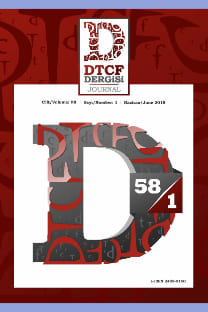A DISCUSSION OF JAMES J. GIBSON'S THEORY OF VISUAL PERCEPTION IN THE CONTEXT OF EMBODIED COGNITION
JAMES J. GIBSON'IN GÖRSEL ALGI KURAMININ BEDENLENMİŞ BİLİŞ KAVRAMI BAĞLAMINDA BİR TARTIŞMASI
___
Amazeen, Eric L., and Michael T. Turvey. “Weight perception and the haptic size- weight illusion are functions of the inertia tensor.” Journal of experimental Psychology: Human Perception and Performance 22.1 (1996): 213-232.Barsalou, Lawrence W. “Grounded cognition.” Annual Review of Psychology 59 (2008): 617-645.
Barsalou, Lawrence W. “Perceptual symbol systems.” Behavioral and Brain Sciences 22 (1999): 577- 660.
Beer, Randall D. “Dynamical approaches to cognitive science.” Trends in Cognitive Sciences 4 (2000): 91-99.
Bingham, Geoffrey P. Lecture notes for Perception/Action, 2008.
Brooks, Rodney. “A robust layered control system for a mobile robot.” IEEE Journal of robotics and Automation 2.1 (1986): 14-23.
Brooks, Rodney. “Intelligence without representation.” Artificial Intelligence 47 (1991): 139-160.
Clark, Andy. “An embodied cognitive science?” Trends in Cognitive Sciences 3 (1999): 345-351.
Clark, Andy, and Davis J. Chalmers. “The extended mind.” Analysis 58 (1998): 10- 23.
Gibson, James J. The ecological approach to visual perception. Boston: Hougton Miffin P, 1979.
Gibson, James J. The Perception of the Visual World. Boston: Hougton Miffin P, 1950.
Gibson, James J. The Senses Considered as Perceptual Systems. Boston: Hougton Miffin P, 1966.
Lakoff, George, and Mark Johnson. Philosophy in the Flesh: The Embodied Mind and Its Challenge to Western Thought. New York: Basic Books, 1999.
Lee, David N. “A theory of visual control of braking based on information about time-to-collision.” Perception 5 (1976): 437-459.
Mossio, Matteo, and Dario Taraborelli. “Action-dependent perceptual invariants: From ecological to sensorimotor approaches.” Consciousness and Cognition 17 (2008): 1324-1340.
Michaels, Claire F., and Claudia Carello. Direct Perception. Englewood Cliffs, NJ: Prentice-Hall, 1981.
Needham, Amy et al. “A pick me up for infants’ exploratory skills: early simulated experiences reaching for objects using ‘sticky’ mittens enhances young infants’ object exploration skills.” Infant Behavior and Development 25.3 (2002): 279- 295.
O’Regan, J. Kevin, and Alva Noë. “A sensorimotor account on vision and visual consciousness.” Behavioral and Brain Sciences 24.5 (2001): 939-1011.
O’Regan, J. Kevin, and Alva Noë. “What It Is Like to See: A Sensorimotor Theory of Perceptual Experience.” Synthese 129.1 (2001): 79-103.
Piaget, Jean. The construction of reality in the child. MIT Press, 1954.
Rauscher, Frances et al. “Gesture, speech, and lexical access: The role of lexical movements in speech production.” Psychological Science 7.4 (1996): 226-31.
Richardson, Michael J. et al. “Ecological psychology: Six principles for an embodied- embedded approach to behavior.” Handbook of Cognitive Science. Ed. Paco Calvo and Antoni Gomila. New York: Elsevier, 2008. 159-187.
Runeson, Sverker. “On the possibility of "smart" perceptual mechanisms.” Scandinavian Journal of Psychology 18.1 (1977): 172-179.
Shapiro, Lawrence. Embodied Cognition: New Problems of Philosophy. New York, NY: Routledge, 2011.
Shapiro, Lawrence. “The embodied cognition research programme.” Philosophy Compass 2.2 (2007): 338-346.
Taraborelli, Dario, and Matteo Mossio. “On the relation between the enactive and the sensorimotor approach to perception.” Consciousness and Cognition 17.4 (2008): 1343-1344.
Thelen, Esther, and Linda B. Smith. A Dynamic Systems Approach to the Development of Cognition and Action. MIT Press, 1994.
Thelen, Esther et al. “The dynamics of embodiment: a field theory of infant perseverative reaching.” Behavioral and Brain Sciences 24 (2001): 1-86.
Todd, James T. “Visual information about moving objects.” Journal of Experimental Psychology: Human Perception and Performance 7.4 (1981): 795-810.
Varela, Francisco J. et al. Embodied Mind: Cognitive Science and Human Experience. Cambridge, MA: MIT Press, 1991.
Wann, John P. et al. “Natural problems for stereoscopic depth perception in virtual environments.” Vision Research 35.19 (1995): 2731-2736.
Warren, William H. “Perceiving affordances: Visual guidance of stair climbing.” Journal of Experimental Psychology: Human Perception and Performance 10.3 (1984): 683-703.
Warren, William H., and Brett R. Fajen. “From optic flow to laws of control.” Optic flow and beyond. Ed. Lucia M. Vaina et al. Boston: Kluwer Academic, 2004. 307–337.
Warren, William H., and Suzanne Whang. “Visual guidance of walking through apertures: Body-scaled information for affordances.” Journal of Experimental Psychology: Human Perception and Performance 13.3 (1987): 371-383.
- ISSN: 0378-2905
- Yayın Aralığı: 2
- Başlangıç: 1942
- Yayıncı: Ankara Üniversitesi Dil ve Tarih-Coğrafya Fakültesi
ÜNİVERSİTE ÖĞRENCİLERİNİN INSTAGRAM'DAKİ BENLİK SUNUMLARI
Günnur ERTONG ATTAR, Arzu ALTUN, Ali GÜNDÜZ
JAMES J. GIBSON'IN GÖRSEL ALGI KURAMININ BEDENLENMİŞ BİLİŞ KAVRAMI BAĞLAMINDA BİR TARTIŞMASI
RUSÇA VE TÜRKÇEDEKİ ZARF-FİİL YAPILARINDAKİ ANLAMSAL ÖZELLİKLER VE ZAMAN KAVRAMI
AN EXPERIMENTAL META-TRAVEL TO “THE HEADQUARTER OF THE ABSOLUTE”: THE INDIA OF GIORGIO MANGANELLI
İSTANBUL ÖĞRETMENLERİNİN BURSA SEYAHATİ VE MUSTAFA KEMAL PAŞA'NIN BAŞÖĞRETMENLİĞE GEÇİŞ KONUŞMASI
BECKETT'İN NOT I OYUNUNDA DİLİN TERSYÜZ EDİLMESİ
A DISCUSSION OF JAMES J. GIBSON'S THEORY OF VISUAL PERCEPTION IN THE CONTEXT OF EMBODIED COGNITION
